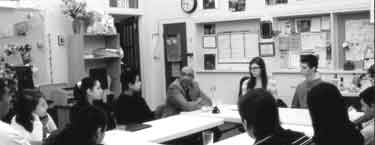Editor’s Note: This article was published originally in the Spring 2012 edition of CLLAS Notes, the newsletter of the Center for Latino/a and Latin American Studies.
—by Dr. Heather McClure, Department of Planning, Public Policy and Management (PPPM)
 Though there is extensive evidence that discrimination-related stress can negatively affect health, very little research to date has focused on the effects of discrimination-related stress for the health of immigrant populations in the United States. Ethnographic studies have provided important insights into those factors in immigrants’ lives that they perceive as stressful (e.g., racism, poverty, undocumented status, language barriers, social isolation); however, qualitative research rarely addresses the physiological effects of immigrant stress. Quantitative research has benefitted from the incorporation of biological markers of stress that can compliment long-used self-report measures, and recent studies indicate that discrimination stress relates to elevated blood pressure and compromised immune function among Latino immigrant men, and obesity and elevated glucose among Latina immigrant women. This quantitative work, however, has yet to adequately address the complex and interrelated social factors that are responsible for these differences.
Though there is extensive evidence that discrimination-related stress can negatively affect health, very little research to date has focused on the effects of discrimination-related stress for the health of immigrant populations in the United States. Ethnographic studies have provided important insights into those factors in immigrants’ lives that they perceive as stressful (e.g., racism, poverty, undocumented status, language barriers, social isolation); however, qualitative research rarely addresses the physiological effects of immigrant stress. Quantitative research has benefitted from the incorporation of biological markers of stress that can compliment long-used self-report measures, and recent studies indicate that discrimination stress relates to elevated blood pressure and compromised immune function among Latino immigrant men, and obesity and elevated glucose among Latina immigrant women. This quantitative work, however, has yet to adequately address the complex and interrelated social factors that are responsible for these differences.
In spring 2011, CLLAS funded a pilot study that brings together Juventud FACETA, a community-based group composed of mostly Latino immigrant youth from the Eugene/Springfield area (a project of Amigos Multicultural Services Center) and University of Oregon anthropology graduate student Iván Sandoval Cervantes and faculty Dr. Heather McClure, Dr. Josh Snodgrass, and Dr. Lynn Stephen to lay the groundwork for a future multi-year study of racism, stress and health among Latino immigrants in Oregon. Three activities were funded by the CLLAS grant, including 1) meetings among project partners toward the design of a future study, 2) youth training activities, and 3) preliminary research consisting of ethnographic interviews and a focus group with Latino immigrant community members residing in the Eugene-Springfield area. The team thus far has trained youth researchers in qualitative methods and the measure of health values (e.g., height, weight, blood pressure), and developed a brief interview protocol to guide the approximately hour and a half long interviews and inform the focus group.
Youth team members took the lead in designing research questions drawing on their extensive collective experience of adjusting to life in the United States and navigating unfamiliar and stressful circumstances and relationships. As a result of their leadership, the project has expanded its original focus on adults to include youth aged 15 to 17 years, and youth interviewers contributed questions that focus on stress associated with learning English and coming into contact with unfamiliar cultural expectations, continuing customs and practicing values rooted in home countries, relationships with family members in the midst of pressures to assimilate, and being bilingual and bicultural (or multilingual and multicultural) in the mostly monolingual English speaking and U.S. born communities in which they live and attend school. Youth also designed questions that focus on resilience and positive coping strategies in the face of difficult conditions in their lives— “can you tell me about a time when you felt strong or courageous?”—and on the meaning of “Latino community” for interviewees. The UO Institutional Review Board approved the bilingual study in April, and youth will conduct eight interviews in May with support from UO team members. Research team members will present on the project’s process and preliminary findings at a public presentation on campus in late May. ■
